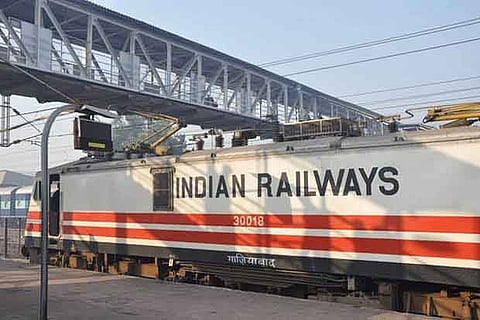

New Delhi
The Indian Railways which carries over 12 lakh passengers every day, aims to provide four lakh more berths for passengers every day from October when it will adopt the technology to generate power from the locomotives instead of the two power cars, railway officials said on Wednesday.
A senior Railway Ministry official related to the development told IANS: "Currently there are one or two power cars attached to the train with diesel generators to supply electricity connection to run the air conditioning units, fans and lights in the train coaches."
The power cars are also called as End on Generation (EOG). The official said that from October onwards, the railways will introduce the new technology known as "Head on Generation" (HOG), which is currently used worldwide to generate power for the AC units, fans and lights in train coaches.
The official said with the HOG technology, the power to provide electric supply to the AC units, fans, lights from the overhead power lines and then is distributed to train coaches. According to the railway ministry officials, by October 2019, over 5,000 coaches of the Indian Railways will operate on the new technology.
"By adopting the HOG technology we will make way for more coaches," the official said, adding that it will also save Rs 6,000 crore in fuel bills annually," said the official.
He pointed out that a power car needs about 40 litres of diesel per hour per non-AC coach while an AC coach needs 65-70 litres of diesel per hour. The official also said the new system is eco-friendly as no air or noise pollution will be there and it will help in reducing carbon emissions by 700 MT per year per train.
The official said by removing one power car from the train, the railways can add a passenger coach in the train thus increasing the number of berths in the train without increasing the train length.
Giving the example of Rajdhani Express, the official said the Rajdhanis are currently hauled by a single locomotive with two diesel-powered generator cars at the rear to provide air conditioning and lighting within the train.
"After carrying out extensive tests, we have decided to remove the power cars. Power, obtained from the overhead cables through the pantograph of the lead engine, will be converted for providing air conditioning and lighting. This will be done through what in technical parlance is known as a hotel load converter," he said.
"By doing so we can attach two more AC-3 tier coaches to the train," he said. Rajdhani Express trains currently have 22 coaches with over 1,200 berths of various categories.
"Once the power cars are removed, they will be replaced with two additional AC-3 tier coaches, adding 130 berths," the official said.
He said that once all LHB coaches are on this system, there will be an increase of more than four lakh berths everyday and thus additional revenue as well. The railways earlier this year tried to increase the speed and number of berths in Hazrat Nizamuddin-Mumbai Rajdhani Express by hauling it with two locomotives, one from front and the other at the rear.
The official said the trial run was approved on Feb 7 by the Research Design and Standard Organisation (RDSO). The pilot project led to the saving of over 105 minutes of travel time between New Delhi and Mumbai as it covered the 1,543 km in about than 17 hours from the previous 19 hours.
"The official pointed out that the push-and-pull technology, being tried out, is successfully adopted globally. This not only increases a train's hauling capacity but also reduces jerks when the brakes are applied as the load gets equally distributed through all the coaches," the official said.
A senior railway ministry official said the railways has last year experimented with twin-locomotives on the Rajdhani, with both engines in front. However, it was found that this did not make for a smooth ride.
Visit news.dtnext.in to explore our interactive epaper!
Download the DT Next app for more exciting features!
Click here for iOS
Click here for Android